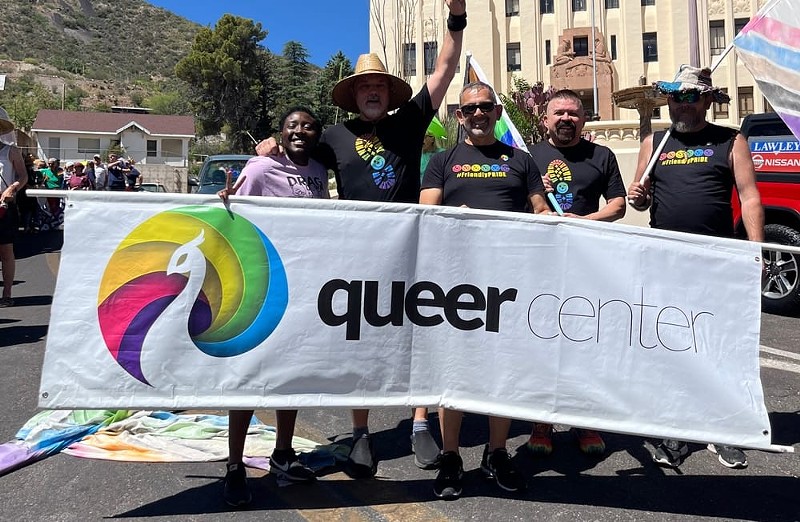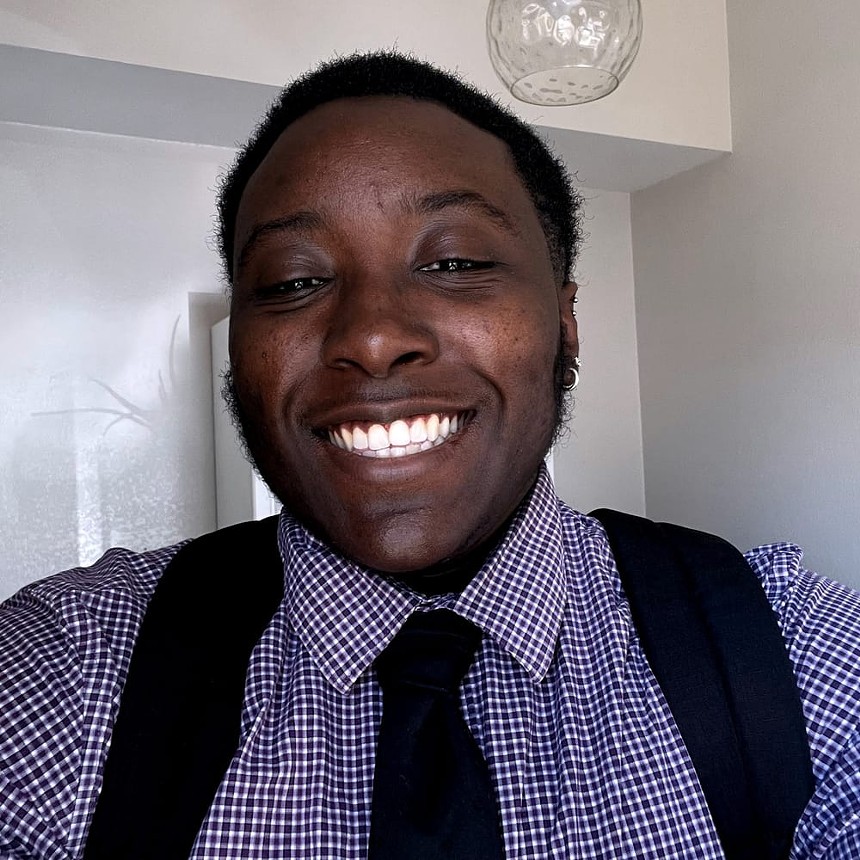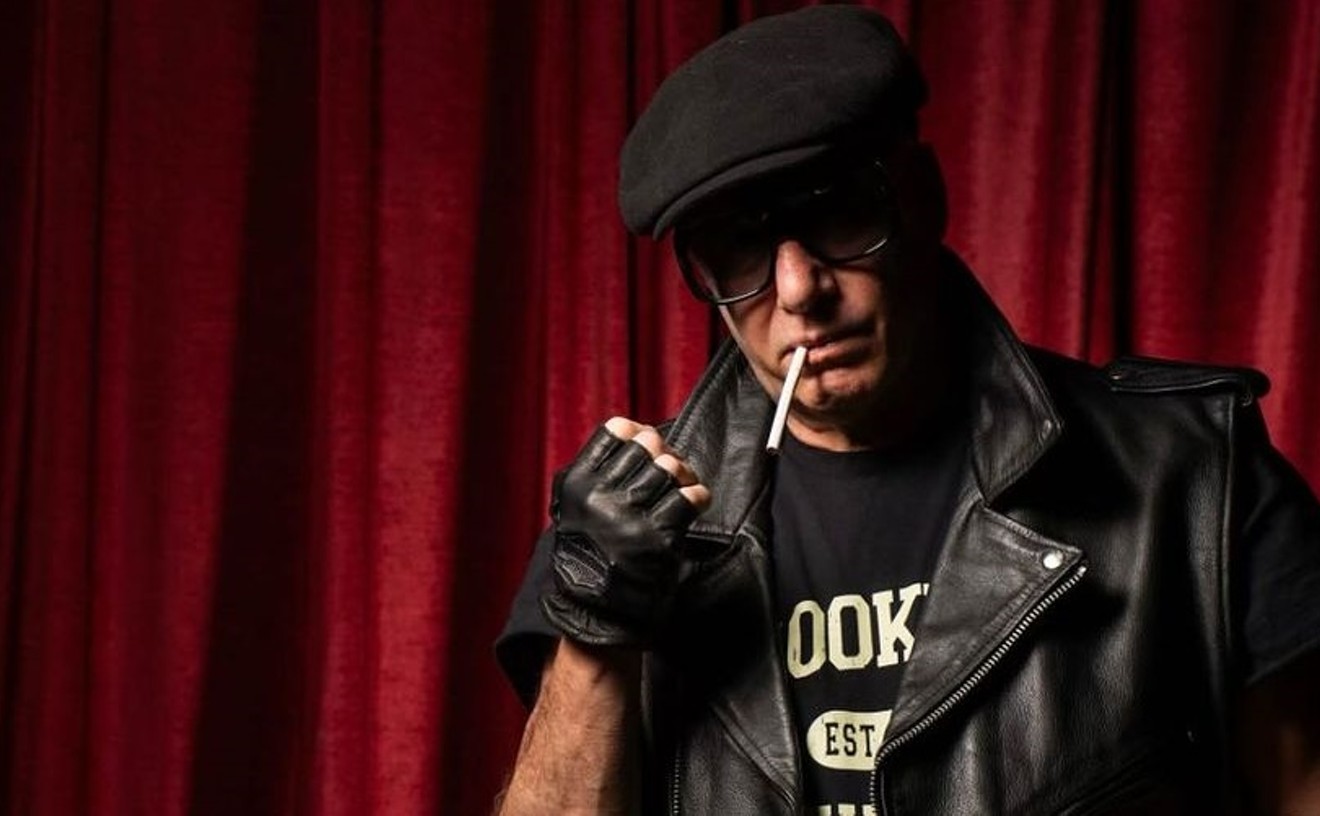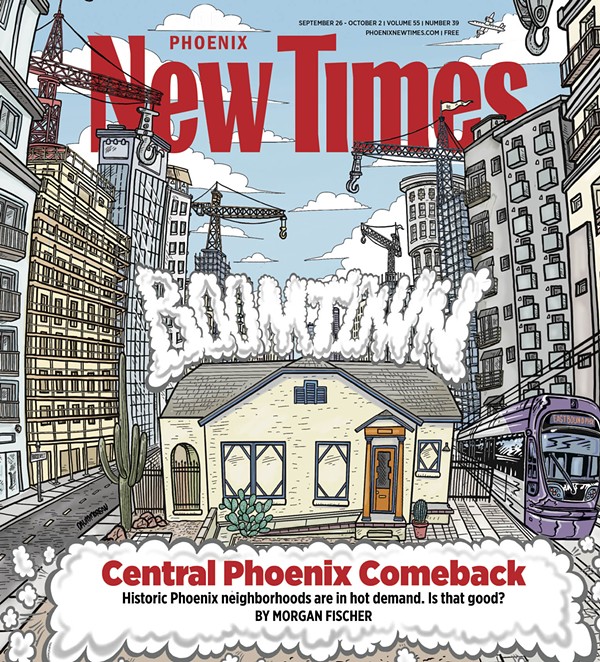This story was first published by LOOKOUT, an investigative nonprofit news organization covering Arizona’s LGBTQ+ communities.
In an unassuming recreation room in downtown Phoenix, members of Trans Spectrum AZ gather community members of all genders. The goal is simple, in theory: to host queer-focused peer support groups that can actually change a life.
Since gender has become a heavily politicized and policed issue, TSAZ is a respite, peer support members said. And it’s there in that small rec room in Roosevelt Row where people can experience something new, find community, and learn more about themselves and their neighbors.
Since 2014, the volunteer-run nonprofit organization has been holding space in the First Church UCC Phoenix — though the group is not religiously affiliated — in order to provide resources, community and support to transgender, nonbinary and gender-expansive individuals, as well as SOFFAs (Significant Others, Friends, Family and Allies of trans peoples).
In addition, TSAZ has partnered with The Queer Center to host events that are focused less on the problems in the community and instead promote joy and fun. This past summer, they threw a trans-friendly pool party at FOUND:RE Hotel, a gender-expansive fashion show and a carwash with the Arizona Ballroom Coalition.
LOOKOUT spoke with TSAZ board member Jay Brown about the effects of the peer support groups, the transformative power of community and visibility, what allies can learn from engaging and the importance of finding your authentic self.
This interview has been edited for length and clarity.
LOOKOUT: However much you are comfortable sharing, I would love to hear more about your personal journey, and how you came to TSAZ.
Jay Brown (he/they): I’m originally from New Jersey, so I spent most of my life there until I moved out to Arizona with my parents. I went to school here at Arizona State University. That entire time, I thought I was a cisgender Black woman, and it was not until COVID lockdown that I really found my true self.
We had time where we could reflect on ourselves without the external pressures of society or peers. So I had all that time to reflect and start thinking: Wait, I don’t have to wear clothes like this, I don’t have to shave my legs, I don’t have to cut my hair. Then on top of that, people went to find communities online.
I was on Twitter, and I saw an artist I follow who had just posted some meme, kind of joking, that was like, “The pipeline from tomboy to transmasc is very strong.” And I had never seen the word “transmasc” in my life, but my whole life I had identified as a tomboy.
So now, I’m 23 years old, sitting in my kitchen crying, because I had spent the last hour learning what transmasc and nonbinary was. I was just like, "This is how I have felt, this is how I am feeling." I remember going to my friends online and saying, “I don’t know what to do, I don’t know what this means for me.” And they said, “Just be Jay.”
I joined TSAZ in December 2021. That was when I went to my first meeting. My facilitator at the time was a trans man who was 65 years old, and seeing a trans man alive, happy and at that age was just so amazing to me. It was mind-blowing, I was so energized after that meeting. I am literally getting teary now just talking about how much that changed my life.
About a year and half after that, I became a facilitator in the groups, and about six months after that, I became a member of the Board.
What is the purpose of the groups?
TSAZ is for gender-expansive and transgender individuals here in Arizona. It is a very welcoming and warm space for those that need support while they are trying to figure things out, getting oriented with their identity.
You have peers, and people from all walks of life to do that with, at all stages in their journey, because no journey is the same. So to hear about those experiences and get those perspectives is honestly key in being able to find your own journey.
When you have a space like that, which is open and vulnerable and true, that is what you can expect from a TSAZ meeting. To find those friends, family, and acquaintances that you can relate to. Because the journey cannot be done alone.
When you never really had a space in your life to explore who you are, you never really got to know what that looks like. So when you have that authentic space, suddenly all these doors start opening within you and without and you have a community to reflect that back to you and help you through it. How does TSAZ create that community?
We talk about peer support, and that support can come in the shape of just being listened to, to hear you out. Community is not all about supporting you, it really is a take and a give. I truly think when you give to a community, there are lessons that come from it, feelings, emotions, experiences, so it’s more than just taking.
TSAZ provides that to meet others, exchange experiencesand give a safe space to have those interactions. Community can push you to a different path, and help you blossom into yourself.
Let’s talk about the importance of visibility.
I think it’s very important. I think visibility comes from not just seeing the identity you identify with, but seeing the spectrum of transgender and nonbinary identity. TSAZ has that spectrum of all different aspects of being transgender, and that gender expansiveness allows you to understand that there is no one way this can be approached. There is no rigidity, no one descriptor, or label.
Because I personally feel gender is very fluid, we are able to identify with the label that may best fit us at this time. We see other identities and journeys, and we might perhaps take those journeys ourselves down the line. There is no one way to be for the rest of your life. It’s a path; it can be winding and bendy.
Visibility not only encourages you, but shows you different paths and a sense that you’re not alone. That is a statement people hear a lot, and they don’t truly know what it means until they feel completely alone, and then they find someone else who confirms or assures them that they aren’t.
Do you see any intersections with social justice, racial justice, gender justice causes and collective resistance?
Intersectionality in social justice movements all deal with human rights. On top of that, when it comes to social justice or racial movements, that’s because of our system in America. We know that BIPOC in this country are fighting for very similar causes. There is a lot of overlap, the things we fight for are so similar, that their wins are our wins, and our wins are theirs.
I think gender goes deeper for all races, all different backgrounds. For example, when it comes to transgender women, we know that Black cis women are especially targeted to be transgender women. That whole idea that cisgender Black women are very manly, that really goes into how misogyny is everywhere.
Yes, misogyny is global, and unfortunately every race and culture still struggles with queerphobia.
Yes, there are so many different backgrounds that have these stigmas. These topics, and having more diversity in TSAZ, and speaking on them in a group is so important. We want more diversity in these groups.
There are tough experiences and microaggressions that I have experienced as a Black trans guy that I share. People will come up to me after the group, and say, “Thank you so much for sharing that. I am sorry you experienced that, I had no idea.” If you’re a transgender white person, you will still never experience the things I have as a trans Black person. What you share can open up someone’s mind.
We don’t live in other people’s lives, so we just don’t know. Just being there to listen, and take it in—and love it—is so important.
Yes, and you could come to peer support groups and just listen. You don’t have to share, or say a word, you could just sit there, take it all in and then leave. No one will judge you or ask questions, and that type of low-pressure environment is sometimes what we all need to open up.
I encourage people who are just finding out about TSAZ to come to a group at least three times. You will find something there, that is when you can take something away.
The vast diversity and beauty of the gender spectrum, and being in a room full of people, that as a young kid I was told did not exist, is very powerful. Not only do you see these people do exist, they are diverse and happy, and living full lives. What gifts would you say the gender-expansive community has to offer the allied community, which includes significant others, friends, and family members?
There are things that we can learn from allies and things they can learn from us. The SOFFAs have definitely helped me in my journey, we have a board member who is a SOFFA, and listening to her perspective really helped me. She said, “Your loved ones are transitioning with you.” That literally opened up my mind, and unlocked so much.
The biggest thing it unlocked was my patience, because when you finally find yourself, everybody else usually already found themselves, or they thought they had. So when you transition, you’re not really thinking about all the other hurdles, obstacles or perhaps just maybe epiphanies that other people have to go through.
So when we have SOFFAs in meetings, and they give their perspective, I never thought of that. Because I am not a SOFFA, so for all of us it is impossible to be in their shoes. You’ve never worn them. The SOFFAs teach us and we teach them, this give and take is so beautiful. We teach the SOFFAs this is probably what’s going on inside your loved one’s mind, and they teach us the same.
It helped me a lot with my family, my father, mother and sister, to understand what they were going through as relatives of a transgender person. It goes beyond learning pronouns, or language to have heavy conversations.
We can all — regardless of gender identity — just show up for each other.
Showing up is the biggest thing. It creates a bigger community, and it helps SOFFAs realize you are an ally, but you are on a whole different spectrum of ally. There are allies that have no one in their life who is transgender, who have no intimate relationships with transgender people. That is different from an ally who is a loved one to a trans or nonbinary person.

Audio By Carbonatix
[
{
"name": "Air - MediumRectangle - Inline Content - Mobile Display Size",
"component": "18478561",
"insertPoint": "2",
"requiredCountToDisplay": "2",
"watchElement": ".fdn-content-body",
"astAdList": [
{
"adType": "rectangle",
"displayTargets": "mobile"
}
]
},{
"name": "Editor Picks",
"component": "16759093",
"insertPoint": "4",
"requiredCountToDisplay": "1",
"watchElement": ".fdn-content-body",
"astAdList": [
{
"adType": "rectangleLeft",
"displayTargets": "desktop|tablet"
},{
"adType": "rectangleRight",
"displayTargets": "desktop|tablet|mobile"
}
]
},{
"name": "Inline Links",
"component": "17980324",
"insertPoint": "8th",
"startingPoint": 8,
"requiredCountToDisplay": "7",
"maxInsertions": 25
},{
"name": "Air - MediumRectangle - Combo - Inline Content",
"component": "16759092",
"insertPoint": "8th",
"startingPoint": 8,
"requiredCountToDisplay": "7",
"maxInsertions": 25,
"watchElement": ".fdn-content-body",
"astAdList": [
{
"adType": "rectangleLeft",
"displayTargets": "desktop|tablet"
},{
"adType": "rectangleRight",
"displayTargets": "desktop|tablet|mobile"
}
]
},{
"name": "Inline Links",
"component": "17980324",
"insertPoint": "8th",
"startingPoint": 12,
"requiredCountToDisplay": "11",
"maxInsertions": 24
},{
"name": "Air - Leaderboard Tower - Combo - Inline Content",
"component": "16759094",
"insertPoint": "8th",
"startingPoint": 12,
"requiredCountToDisplay": "11",
"maxInsertions": 24,
"watchElement": ".fdn-content-body",
"astAdList": [
{
"adType": "leaderboardInlineContent",
"displayTargets": "desktop|tablet"
},{
"adType": "tower",
"displayTargets": "mobile"
}
]
}
]












